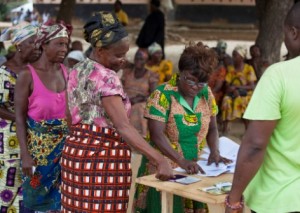Increase levels of grant paid to LEAP beneficiaries – SEND Ghana
 SEND Ghana has urged the Government to increase the grant paid to beneficiaries of the Livelihood Empowerment Against Poverty (LEAP) to a little above the daily poverty threshold of GH¢2.09, and also ensure its timely payment.
SEND Ghana has urged the Government to increase the grant paid to beneficiaries of the Livelihood Empowerment Against Poverty (LEAP) to a little above the daily poverty threshold of GH¢2.09, and also ensure its timely payment.
It also asked the Government to make adequate provisions for the social protection expenditure, which would be captured in the 2020 Budget Statement to be presented to Parliament on Wednesday, November 13.
At a media conference in Accra, Dr Emmanuel Ayifah, Deputy Country Director, SEND Ghana stated: “SEND wishes to remind government, as it presents the 2020 Budget Statement and Economic Policy to make adequate provision for social protection expenditure and ensure that such budgetary allocations are fully and timely disburse”.
The LEAP grant, introduced in 2008, is allotted to orphans; vulnerable children and caregivers; the needy of 65 years or above; severely disabled people who cannot work; and poor pregnant women in the poorest communities. Currently a household of a beneficiary is paid GH¢64 every two months.
Households of two, three and four beneficiaries are paid GH¢74, 83 and GH¢106, respectively every two months.
The media conference was to update the media on some developments on the levels of the grant and regularity of inflows.
Dr Ayifah said information gathered during SEND Ghana’s monitoring exercise, as well as some media reports, suggested that the key demands of the beneficiaries were for an increment and timely payments.
These concerns, he said, resonated the voices of diverse groups and stakeholders, including civil societies, research institutions and the academia.
“We are of the opinion that social protection is the right of citizens and that it is not a favour being done to the beneficiaries. Therefore, government’s attempt at fulfilling such rights must not be done partially”.
Ghana, he said, risked derailing the progress made in her efforts towards defeating poverty and reducing inequalities if there were needless delays in the disbursement of poverty interventions, such as LEAP grants.
“We, therefore, urge government to never again delay in the payment of LEAP beneficiaries because the effect of such undue delays could be devastating on the lives of the poor and vulnerable,” he added.
The release of funds for the 61st LEAP Payment to beneficiaries across the country reportedly delayed.
This affected some 30,000 LEAP households, with more than 125,000 beneficiaries in 10 districts across the country during the previous payment in June.
This was largely attributed delays in approval by some government agencies and the verification processes at the Controller and Accountant General’s Department.
The situation resulted in discomfort and anxiety among the beneficiary households, while some social welfare officers at the district level also suffered the loss credibility and integrity.
The beneficiaries, according to SEND Ghana, had to borrow from friends, others relied on the benevolence of relatives for the purposes of feeding and healthcare.
“Some could not afford to cater for the needs of their dependants in school. Those who engaged in subsistence farming could not access subsidised inputs such as agrochemicals, to help their crops grow”.
Dr Ayifah, however, lauded the Government’s efforts in releasing funds for the payment of the grant in October this year, noting that payment to LEAP beneficiaries had since been completed in most parts of the regions.
SEND Ghana is a public policy and advocacy organisation committed to promoting good governance and accountability.
Source: GNA
